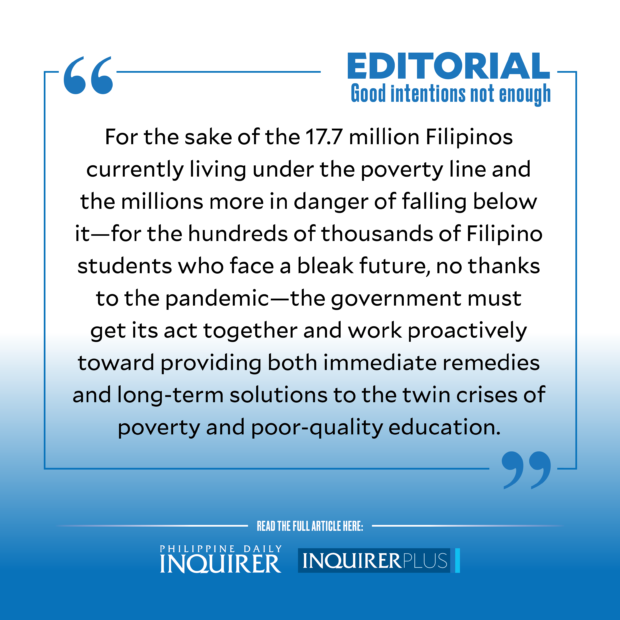Last week’s chaotic scene at the headquarters of the Department of Social Welfare and Development (DSWD)—where would-be beneficiaries for the government’s freshly announced financial assistance for indigent students hoped to receive the aid—was a sad sight to behold.
Thousands of people swarmed the agency’s central office, and apparently, at its satellite offices around the country, too, hoping to receive anywhere from P1,000 to P4,000 as part of the P500-million package that Social Welfare Secretary Erwin Tulfo announced would be distributed to the public.
The problem was that the scheme was so badly implemented that it resulted in a systemless crush of crowds at the agency’s offices, with many reported injured when a stampede broke out at its Zamboanga City branch.
Like many things initiated by the government in this country, the DSWD fiasco could be viewed as an example of what ails the Philippines: good intentions badly executed.
Take the case of the country’s poverty situation.
Government statisticians reported last week that an estimated 2.3 million Filipinos joined the ranks of the poor since the COVID-19 pandemic broke out in early 2020. This means that, in total, there are now almost 20 million of our citizens living below the poverty line, defined as a monthly income of P12,030 for an average family of five.
This is substantially higher than the 17.7 million Filipinos living under the poverty threshold the last time a survey was conducted in 2018, although lower than the 2015 count of 23.7 million people.
The clear culprit is the pandemic, which ravaged the country’s economy and caused the largest contraction in output and production since World War II.
The Marcos Jr. administration realizes the gravity of the situation and has announced plans to reduce the poverty incidence to 9 percent from the latest level of 13.2 percent recorded last year.
This good intention is laudable but, again, needs to be executed properly for words and plans to translate into tangible benefits for hungry and jobless Filipinos.
There is a government instrumentality called the National Anti-Poverty Commission, which was created precisely to coordinate the execution of plans to this end, but little has been heard from it of late. What the Marcos Jr. administration needs to do is to empower this agency—or any other point person—to execute the government’s strategies for lifting millions of citizens out of extreme hardship.
On top of reopening the economy to ensure that enough jobs are generated for workers, a coherent, cohesive plan needs to be instituted that will ensure that all agencies of government work toward this singular goal.
At the same time, the focus needs to be given to the millions of Filipino students who received poor quality education during the last three years when face-to-face classes were prohibited.
The World Bank and our own National Economic and Development Authority have warned that the Philippine economy stands to suffer trillions of pesos in opportunity losses over the next few decades—in what both institutions describe as “scarring”—due to the poor state of education wrought by COVID-19.
In short, generations of Filipino students stand to become less educated, less employable, and consequently less productive members of society when they grow up due to the gap in learning of the last three years.
Resources should be channeled their way to prevent them from becoming a “lost generation” that will burden the Philippine economy for years, akin to the Japanese youth who suffered the malaise of that country’s stagnation in the 1990s and are now stuck in menial jobs with no upward social mobility.
Special attention should be given to improving the poor quality of online education that Filipino students received over the last three years to ensure that they catch up with the rest of their peers, as blended learning remains a viable mode while the pandemic persists.
Indeed, only through the proper execution of these good intentions can the government hope to make a long-term impact in its age-old battle against poverty, and make sure the war is won rather than lost.
For the sake of the 19.9 million Filipinos currently living under the poverty line and the millions more in danger of falling below it—for the hundreds of thousands of Filipino students who face a bleak future, no thanks to the pandemic—the government must get its act together and work proactively toward providing both immediate remedies and long-term solutions to the twin crises of poverty and poor-quality education.
Good intentions are good. That is the baseline requirement. But good intentions combined with great execution from our policymakers are much better.
Impoverished Filipinos deserve more dignity than joining a chaotic crowd of aid seekers outside a government office waiting for short-term relief.


